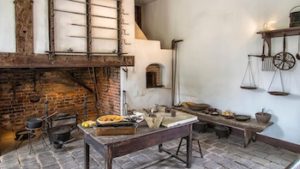
Posey's workspace
*This date in 1748 is celebrated as the birth date of Hercules Posey, an enslaved African owned by George Washington.
He was born around 1748 and owned by America's first president as collateral for an unpaid loan to his original owner, Washington's neighbor John Posey. "Uncle Harkless," as George Washington Parke Custis called him, was a chief cook at the Mansion House for many years.
He first appeared on tax records for Mount Vernon in 1771. Hercules chose Alice, one of Martha Washington's "Dower" enslaved people, as his wife, and they had three children: Richmond, Eve, and Delia. He, Alice, and the three children were listed in the February 1786 Mount Vernon Slave Census, which records him as one of two cooks in the Mansion House. Alice died in 1787. He was one of nine enslaved Africans brought to Philadelphia in 1790 by Washington to work in the presidential household.
In the memoirs of Martha Washington's grandson, G.W.P. Custis, Posey was recalled as "a celebrated artiste ... as highly accomplished and proficient in the culinary art as could be found in the United States." The cook was given the privilege of selling the extra food from the Philadelphia kitchen, which, by Custis's estimate, earned him nearly $200 a year, the annual salary of a hired cook. According to Custis, Hercules was free to walk about in the city.
Washington allowed Poseys' son Richmond to work alongside his father in the Philadelphia kitchen for about a year before returning him to Virginia. In November 1796, Richmond was implicated in the theft of money at Mount Vernon. Washington had suspicions that the father and son were planning a joint escape. In 1780, Pennsylvania passed the Gradual Abolition Act, which freed all future children of the state's slaves. It also prohibited non-resident slaveholders living in Pennsylvania from holding enslaved people in the state for six months.
If held beyond that period, the act empowered those enslaved people to register as Pennsylvania residents and claim their freedom. Members of Congress and their slaves were specifically exempted from the act. Officers of the executive and judicial branches of the federal government were not mentioned since those branches did not exist until the U.S. Constitution was ratified in 1789. When the national capital moved to Philadelphia in 1790, there was a question about whether the state law would apply to federal officials.
Washington argued (privately) that he was a citizen of Virginia, that his presence in Pennsylvania was solely a consequence of Philadelphia's being the temporary national capital, and that the state law should not apply to him. Rather than challenging the state law in court, Washington systematically rotated the President's House slaves in and out of the state to prevent their establishing a six-month continuous residency.
On February 22, 1797, Washington's 65th birthday, Posey escaped from Mount Vernon and fled to New York City, where he lived under the name "Hercules Posey." A slave census taken in June 1799, only a few months before George Washington's death, shows that Richmond, in his early twenties, was working at the River Farm on the outlying part of Mount Vernon while Eve and Delia, in their teens, were working at the Mansion House. Posey remained a fugitive slave until January 1, 1801, when he was freed under Washington's will. Because Posey's late wife Alice had been a "Dower" enslaved person, owned by the Estate of Martha Washington's first husband, their three children were not freed.
Hercules Posey died on May 15, 1812. He was buried in the Second African Burying Ground. A new building for the Liberty Bell opened in Philadelphia in 2003. In 2000, remnants of the icehouse of the demolished President's House were uncovered. A more extensive archeological excavation in 2007 revealed the foundations of the kitchen, an underground passage that connected the kitchen to the main house, and the foundations of the Bow Window (a precursor to the Oval Office). A memorial on the site of the President's House commemorates the house and the enslaved people there, as well as Philadelphia's history and American history.